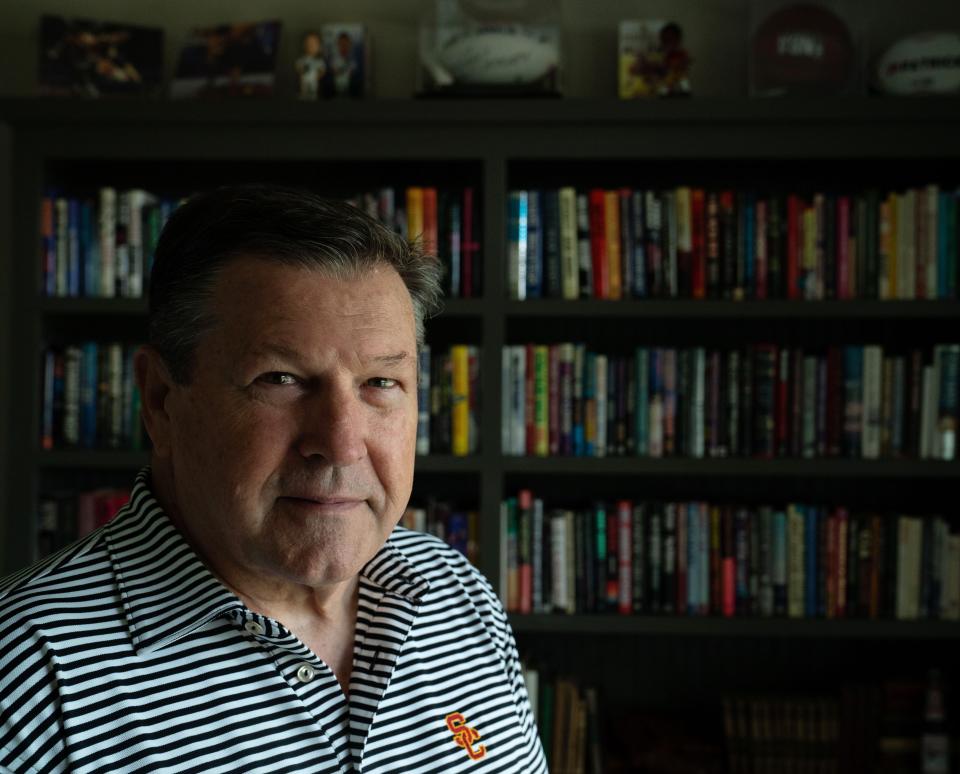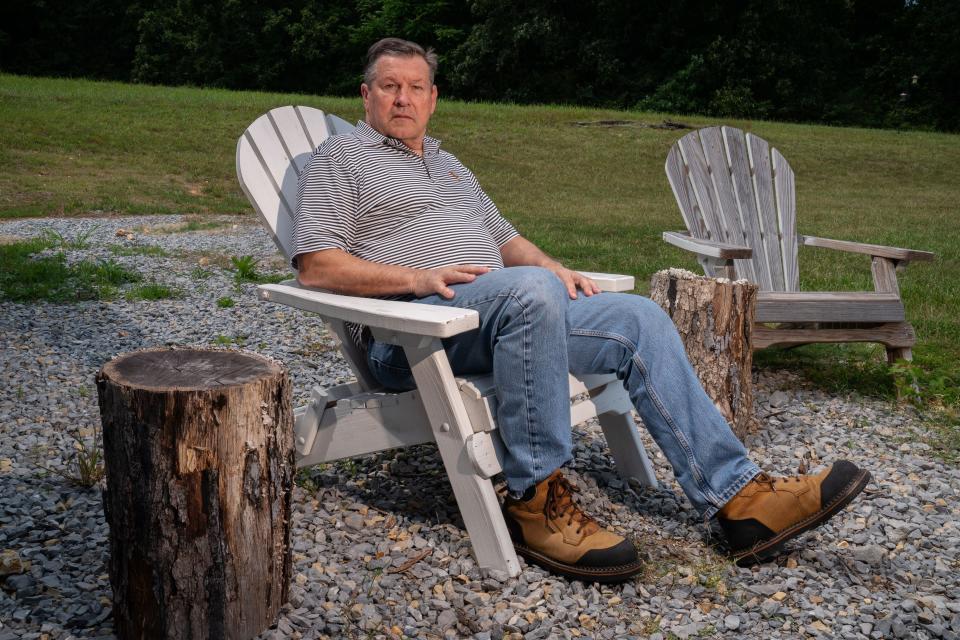He spent a career helping others after shootings. This is what he thinks will stop them.
Mentally ill and decompensating, the college student wrote a poem to an instructor he said he loved and wanted to kill.
“I can still hear your voice, your tone, your seeping repugnance toward me, your laugh, your eyes, your lies ...”
The last line of the poem was particularly alarming:
“I have it all scarred and branded in my mind that I will not stop till I satisfy my hunger to murder you.”
That's when Patrick Prince went to work.
Prince, the chief threat assessment officer at the University of Southern California, met with a team of responders representing mental health, campus security, law enforcement and education. He also met with the instructor, the student and his parents.

Prince believes "more guns equals more death," so he tries to stop shootings long before the firearms appear.
He has consulted on more than 3,500 threatening situations/acts of violence at government agencies, private companies and schools.
One question in Prince's mind: Was this student a committed shooter?
Because once a shooter is committed, someone almost always dies.
Prince lives at the end of a long gravel road across from a cemetery in Fairview, Tennessee, about 2,000 miles from his campus office. He has worked as a consultant in trauma response and prevention for 40 years. After following the details of The Covenant School shooting in Nashville, Tennessee, (which was not one of his cases), he has strong opinions about how incidents like that could be avoided and criticism for those who think arming teachers and employees will cut down on mass shooting deaths.
Some people call him "The Grim Reaper."
For good reason.
A history of trauma

He got his start in electrocutions.
In the early 1980s, Prince took a job at the L.A. Department of Water and Power. He was in his 20s when he was put in charge of consoling the families of employees who had been electrocuted on the job.
"There were a lot of electrocutions," he said.
He helped develop a trauma response program which eventually became his business. He opened a trauma response consulting firm with psychologist Ann Phelps. Prince & Phelps Consultants became a well-known workplace trauma-handling firm.
"I felt like I did death notifications every month," said Prince, now 67. "Nobody wants to see me."
His brand of trauma response began to expand on May 6, 1993.
On that day, Mark Hilbun stabbed his mother to death, slashed and killed her cocker spaniel, went to a post office in Dana Point, California, and shot several of his co-workers. One person was shot to death and seven others were injured. Hilbun was later arrested and received nine life sentences.
Prince worked to console the families of the shooting victims. He helped to get the post office up and running again.
"People inside the office had eight guns because they were afraid of Mark," Prince said.
In the wake of that shooting, Prince started to form the opinion that guns in the workplace won't help.
Moving to Tennessee
His father, Air Force Brig. Gen. Philip Prince, moved his family around the world. They lived in Taiwan, Italy and the United States (Alabama, Illinois, California and Rhode Island during his high school years alone).
Prince said he developed empathy as a child. He witnessed crosses being burned in yards in Alabama and civil rights marches. He was 13 when he fell in a hole and nearly died. Since his father was in the military, Prince recovered in a Veterans Administration hospital and got to know Vietnam veterans.
He went to college at USC and did graduate work at UCLA before he started working in trauma. That's what he wanted to do. He was motivated by trying to tackle the seemingly impossible task of helping someone recover from tragedy.
"I was good at it," he said.
He has six children in a blended family with his second wife, Caren. They moved to Tennessee in 2015 after visiting the Grand Ole Opry where they saw Darius Rucker and Little Big Town (and a surprise appearance by Steven Tyler).
"Caren is a country girl at heart," he said.
Arming teachers is a bad solution
He has worked in the aftermath of shootings in Roanoke, Virginia (TV station WDBJ); Saugus, California (high school shooting); Fresno, California (shooting at a raisin processing plant); and Santee, California (high school shooting), among thousands of others.
The Santee incident (at Santana High School in 2001) is important in the Prince family. Caren went to Santana High, and two of her nephews were in the school when 15-year-old Charles Andrew Williams shot 15 people, killing two.
"Sometimes, some of his stories can be scary," Caren Prince said. "There's an amount of fear everyone should carry. He wouldn't be doing this if he didn't think he could help. I believe he has helped."
Poll: Is stopping gun violence more important than gun rights? Most Americans say yes
Bottom line: Patrick Prince says addressing mass shooters after they have committed to killing people is not effective. He says arming teachers is a bad solution. Hardening work places won't stop a determined killer.
"Many things we do are meaningless," he said. "We should be asking, 'How can we prevent them?'"
The most effective solution, he said, is finding lone wolf shooters before they decide to kill.
That isn't as difficult as it sounds, he said. Prince quotes a 2018 FBI study that shows 56% of mass shooters engage in concerning behaviors for two years prior to carrying out the act.
He said 98% of people connected to shooters know something is wrong.
"They ruminate over perceived injustices," he said. He calls it "Hostile Attributional Violence" or putting a name and face to a grievance.
Prince said the people who become shooters are a combination of three things:
Helpless.
Hopeless.
Humiliated.
"Something has affected their identity, their feeling of self worth," Prince said.
People don't want to shoot
At Covenant, there was an armed presence inside the school, the staff and students had practiced active shooter drills (Run, hide. fight are the usual buzzwords) and the police response was, arguably, as effective as it could have been.
Still, three staff members and three students were killed.
More: The US passed a landmark gun deal one year ago. Is it working?
The most important conclusion he has come to in dealing with four decades of trauma, by far:
"People don't want to come in and shoot up the place," he said.
If we can all agree on that, he said, we can direct our resources to finding and easing the minds of the helpless, hopeless and humiliated among us.
"Let's deal with them when they're fantasizing about shooting," he said.
Like the college student who wrote the poem.
"My hunger to murder you," he wrote.
Prince convinced the university NOT to expel the student. Instead, he directed the man and his parents to mental health services and he started treatment.
"If you want to make the environment safer," Prince advised, "let him finish his classes."
Prince himself (and others) walked the student into and out of class each day so he could continue his studies.
In 2019, that student got his college degree.
And no one died.
This article originally appeared on Nashville Tennessean: Tennessee shooting and trauma expert on how to stop gun violence

